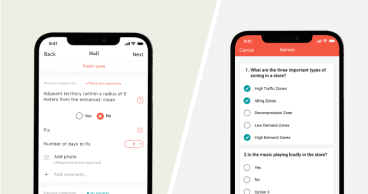Qvalon Blog article content
Before we answer why there are differences between expectations from operational audits and their actual results, let us first understand the audit’s purpose, which is mainly to provide consistent reliable information about:
-
Quality of standards and business processes in the company.
-
Regional and global issues within the network.
-
Customer’s expectations from the company's services.
“Whoever owns the information owns the world.”
Nathan Mayer Rothschild

Companies that have timely availability of reliable information certainly have the competitive edge as they can undertake effective strategic planning. Let us use an example to detail the advantages of implementing operational audits.
Benefits of implementing an operational audit
|
|
Without operational audit |
With operational audit |
|---|---|---|
|
Operating Block |
Managers may have information about the scope of improvements in the company, but they do not fully understand the reasons for lagging behind competitors. They make impulsive decisions that are not always the best for the company. |
The manager knows exactly which business processes in the company are inefficient and understands the reasons for losing market position to competitors. He makes the right decisions based on audit results and prevails. |
|
Marketing Block |
Without sufficient knowledge about customers and their preferences, the company provides irrelevant offers, which leads to a reduction of customer loyalty, traffic outflow, etc. |
With sufficient knowledge about its customers, the company can provide the most competitive offers which help drive sales and revenues. |
Today most companies understand the importance of operational audits. Many retailers have already implemented regular operational audits to conduct quality control of business processes. But they do not always get the expected result. Let us find out the reasons.

Reason 1. Outdated operational audit methods and techniques
In general, the operational audit process seems simple enough, which is to periodically check the quality of business processes according to checklists and set tasks for employees to correct the identified flaws. It is assumed that these tasks can be done with a little improvisation. For example, printed checklists can be provided to auditors or answers can be recorded in spreadsheets.
However, this approach does not give expected results as it can not provide a quick exchange of information. In a regular scenario, the auditor must first fill all the checklists, then transfer the results into digital format, collate all the data, and then analyze it for insights. This consumes much time, the manager learns about existing problems with considerable delay and is not able to promptly address them.
To have updated information, it is necessary to use modern technological systems for conducting operational audits, such as QVALON.
Reason 2. Incorrectly select technical solution for operational audit
Often, the decision to choose an IT solution is made on financial grounds. As a result, the solution implemented is not the one that has all the necessary functions and features to solve all the issues and problems, but the one that costs less. Naturally, the results obtained will not be as per expectations, because no matter how hard one tries, a calculator will not match the capabilities of a high-performance computer.
It is also worth mentioning that sometimes companies implement IT solutions without a trial or they conduct a pilot but only for the sake of protocols. And they are surprised when the applied IT solution lacks the functions required to solve their issues. Before finalizing a tech product or service, a pilot project must be conducted on it with the following matters addressed:
-
Define qualitative or quantitative metrics.
-
Select participants (no need to involve the whole company or the majority of it for the pilot).
-
Test all the modules of the tech solution.
-
Regularly analyze the pilot data.
-
Summarize and draw conclusions.
Reason 3. Lack of approach towards operational audit process implementation
Companies that are dissatisfied with their operational audit results, often seek consultation. After reviewing such requests, it is found that 40% of such companies do not have a dedicated plan to execute operational audits and they make a number of mistakes such as,
-
perceiving that their audit system is a magic wand that will do everything by itself for everyone;
-
not appointing a project leader and not involving other participants in the operational audits;
-
lacking a clear strategy to implement a technological audit system into the company’s current, everyday scenarios as they do not know all the features and functionalities of the system;
-
not applying operational audit methodology.
Some of the above mistakes are easy to correct. It is enough to understand that any technical platform is just a tool. It can be more or less convenient, have certain functions and features, but it is useless without people. This means that in addition to an IT audit system, companies need to assign responsibility to their employees who will drive the project internally by being consistently involved and getting other employees to participate. The administration of systems like QVALON does not necessitate a dedicated employee. In most cases, the administrator can combine this work with their regular tasks.
Other issues are more difficult to resolve. For the operational audit to provide the desired results, it is important to understand not only the system’s technical side but also its methodological side. The must-do’s:
-
build up the operational audit concept (participants, their responsibilities, deadlines, etc.);
-
upload correct data in the system;
-
customize the system to the company’s requirements and traits;
-
make checklists correctly;
-
determine the audit frequency;
-
assign authority for report analysis and its frequency.
To effectively organize the operational audit process through any system, it is necessary to understand its capabilities (for which pilot projects should be done). For example, in QVALON, in addition to checklists, there are more features like tasks management, photo reports, video monitoring, surveys, analytics, etc.
These features can be reviewed independently, but it is better to use a methodological approach that is faster and avoids most of the errors during system implementation.
Differences between the independent implementation of QVALON and with the participation of an expert methodologist
|
Parameters |
Independent |
Methodologist |
|---|---|---|
|
Implementation speed |
Low |
High |
|
Time spent on data entry |
High |
Low |
|
System setup quality |
Low |
High |
|
Knowledge about system tools and application scenarios |
Low |
High |
|
Knowledge about checklist methodology |
Missing in most cases (checklists are compiled incorrectly, have low efficiency). |
At a high level (effective checklists). |
|
Staff training |
Low |
High |
|
Administrator's training |
Low |
High |
|
Analytics ability |
Low |
High |
Methodological errors
Among businesses that reported difficulties in getting operational audit results, 60% made methodological mistakes. Everyone's shortcomings were different, but some of them were most frequent:
Ill-conceived structure for audit participants
Companies often start the implementation process prematurely, without much planning and paying attention to nuances and details. They assign responsibility to one person, who in turn delegates it to their subordinates. They do their work on a case-by-case basis so the process is running, but with no clear understanding of the following questions.
-
Who will participate in the audit (departments, employees, processes, etc)?
-
Who will audit?
-
Which facilities and which employees are under audit?
-
What is the audit frequency?
-
Notifications will be sent to whom?
-
Who will receive audit reports? and so on.
It is unlikely that with such a spontaneous structure of operational audit, one can expect any adequate results.
Lack of staff motivation and involvement
One of the worst things during implementation is ineffective communication with the staff about the need for operational audits, and in particular, the purpose of an IT audit system. In such cases, the workforce will think that the IT system is an exclusively punitive tool aimed at finding their mistakes, although this perception is fundamentally wrong. Hence, the staff rejects the innovation without fully understanding it and provokes further demotivation among employees.
It is risky to entrust audits to employees who do not fully understand its process, significance and are disinterested to learn. They will perform their duties poorly, which will inevitably affect the operational audit results.
Incorrect compilation of checklists
Checklists are often compiled with the notion that "the more questions, the better", under which they lose the criteria to evaluate each standard. Consequently, the checklists are too large and incomprehensible either for the auditors or for those being checked, or both. In another case, the checklists are copied from the internet or the previous workplaces of the employees. The checklist should be based on the individual characteristics of the company’s operational processes and should reflect the company’s desired goals and objectives. Why checklist do not work
Another consequence is the occurrence of conflict situations between auditors and staff due to a difference in understanding of checklist issues and evaluation criteria.
Non-systematic audits
Planning and conducting audits is often decided by the employees, while management does not care much for either their execution or results. There are situations when in one month the audit is carried out weekly, and in the next month, it is done only once or not even that. The system's capabilities for planning and implementing periodic checks are not used. Due to this audit results are obtained in a haphazard and unreliable way.
Insufficient employee training
Companies often cultivate the process of learning on the job, when employees need to use a new system. They study it independently and become aware of the functionalities as they apply them to their regular work responsibilities. As a result, the implementation is delayed, and employees make a lot of mistakes if they manage to understand the system beyond the basic features used for performing elementary actions. Hence operational audit results, in this case, are unlikely to meet the expectations.
Get expected results
There can be many errors in conducting an operational audit. The most obvious and frequent ones have been just described. It is unlikely to avoid them when the audit system is implemented independently, without any planned approach towards employee training. It is similar to violating traffic rules while learning to drive a car without an instructor. This approach always requires considerable time and resources.
If you learn with the correct approach from the beginning, you save time, avoid mistakes, and get expected operational audit results.



